初中虚拟语气讲解及专项练习与答案(带解析)
英语虚拟语气答题技巧及练习题(含答案)及解析

英语虚拟语气答题技巧及练习题(含答案)及解析一、初中英语虚拟语气1.---If I were you, I ________ study harderA.had B.would C.did D . do【答案】B【解析】试题分析:虚拟语气是一种特殊的动词形式,用来表示说话人所说的话并不是事实,而是一种假设、愿望、怀疑或推测。
判断是真实条件句还是非真实条件句。
只有在非真实条件句中才使用虚拟语气。
通过句子意思,看假设的条件是否能够实现,能够实现是真实条件句,不能使用虚拟语气;假设的条件不能实现则是非真实条件句,要用虚拟语气.判断这个假设是与哪个事实相反。
1、与现在事实相反若与现在事实相反,条件从句的谓语用过去式(be通常用were),主句谓语用“should (would, could, might)+动词原形”2、与过去事实相反若与过去事实相反,条件从句的谓语用过去完成时(had+过去分词),主句谓语用“should (would, could, might)+have+过去分词”3、与将来事实相反若与将来事实相反,条件从句的谓语用过去式(be通常用were),主句谓语用“should (would, could, might)+动词原形”:句意:如果我是你,我会学习更努力。
结合语境可知本句表示的是对现在的虚拟,故从句中用过去时态,主句中用过去将来时态。
选B。
考点:考查虚拟语气2.If I you, I the army.A.am, would join B.were, would join C.am, will join D.were, will join【答案】B【解析】试题分析:句意:如果我是你,我会参军.结合语境可知本句是对客观状况的虚拟,故用过去时态,主句用过去将来时态.选B.考点:if引导的条件状语从句点评:虚拟语气是一种特殊的动词形式,用来表示说话人所说的话并不是事实,而是一种假设、愿望、怀疑或推测。
【英语】初中必备英语虚拟语气技巧全解及练习题(含答案)含解析
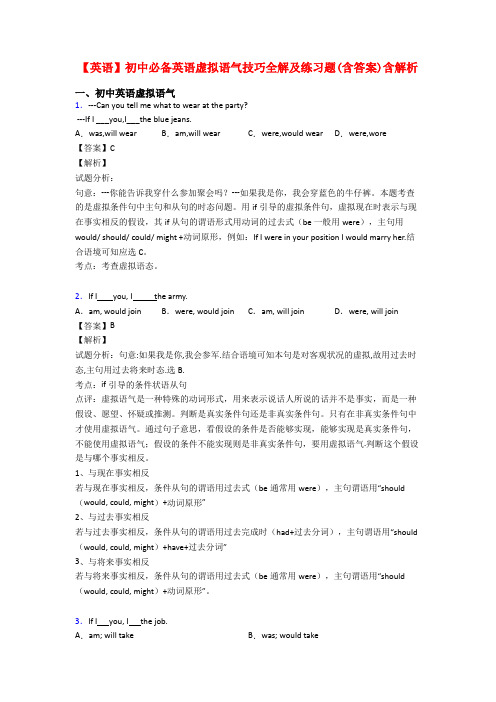
【英语】初中必备英语虚拟语气技巧全解及练习题(含答案)含解析一、初中英语虚拟语气1.---Can you tell me what to wear at the party?---If I ___you,I___the blue jeans.A.was,will wear B.am,will wear C.were,would wear D.were,wore【答案】C【解析】试题分析:句意:---你能告诉我穿什么参加聚会吗?---如果我是你,我会穿蓝色的牛仔裤。
本题考查的是虚拟条件句中主句和从句的时态问题。
用if引导的虚拟条件句,虚拟现在时表示与现在事实相反的假设,其if 从句的谓语形式用动词的过去式(be 一般用were),主句用would/ should/ could/ might +动词原形,例如:If I were in your position I would marry her.结合语境可知应选C。
考点:考查虚拟语态。
2.If I you, I the army.A.am, would join B.were, would join C.am, will join D.were, will join【答案】B【解析】试题分析:句意:如果我是你,我会参军.结合语境可知本句是对客观状况的虚拟,故用过去时态,主句用过去将来时态.选B.考点:if引导的条件状语从句点评:虚拟语气是一种特殊的动词形式,用来表示说话人所说的话并不是事实,而是一种假设、愿望、怀疑或推测。
判断是真实条件句还是非真实条件句。
只有在非真实条件句中才使用虚拟语气。
通过句子意思,看假设的条件是否能够实现,能够实现是真实条件句,不能使用虚拟语气;假设的条件不能实现则是非真实条件句,要用虚拟语气.判断这个假设是与哪个事实相反。
1、与现在事实相反若与现在事实相反,条件从句的谓语用过去式(be通常用were),主句谓语用“should (would, could, might)+动词原形”2、与过去事实相反若与过去事实相反,条件从句的谓语用过去完成时(had+过去分词),主句谓语用“should (would, could, might)+have+过去分词”3、与将来事实相反若与将来事实相反,条件从句的谓语用过去式(be通常用were),主句谓语用“sh ould (would, could, might)+动词原形”。
初中虚拟语气讲解及专项练习与答案(带解析)复习进程

初中虚拟语气讲解及专项练习与答案(带解析)虚拟语气讲解语气 (mood) 是一种动词形式,用以表示说话者的意图或态度。
英语中的语气有三种:陈述语气、祈使语气和虚拟语气。
直陈语气(indicative mood),表示所说的话是事实。
祈使语气 (imperative mood),表示所说的话是请求或命令。
虚拟语气(subjunctive mood),表示说的话不是事实,或者是不可能发生的情况,而是一种愿望、建议或与事实相反的假设等。
一. 虚拟语气在条件句中的应用学习虚拟语气在条件句中的用法之前我们必须清楚条件句的种类:条件句有真实条件句与非真实条件句(或称虚拟条件句)两种。
真实条件句所表的假设是可能发生或实现的,句中的条件从句与结果主句都用陈述语气。
如:If it doesn’t rain tomorrow, I will go for a picnic. 假若明天不下雨,我就去野餐。
Oil floats if you pour it on water. 你如把油倒在水里,油就浮起来。
虚拟条件句所表的假设则是不可能或不大可能发生或实现的,句中的条件从句与结果主句皆须用虚拟语气。
1. 与现在事实相反的虚拟条件句,条件从句的谓语用动词的过去式 (be的过去式用were), 主句的谓语用should (would, might, could)+动词原形。
如: If it were not raining, we should go for a picnic.如果现在不下雨的话,我们就出去野餐了。
(事实是:天在下雨,我们不能出去野餐。
表示愿望。
)If he came here, he might be able to help you. 如果他来这,他就能够帮助你了。
(事实是:他没来这,他不可能帮助你。
表示对他的良好印象。
)2. 与过去事实相反的虚拟条件句,条件从句的谓语用had+过去分词,主句的谓语用should( would, might, could)+ have +过去分词。
初中虚拟语气讲解及练习含答案
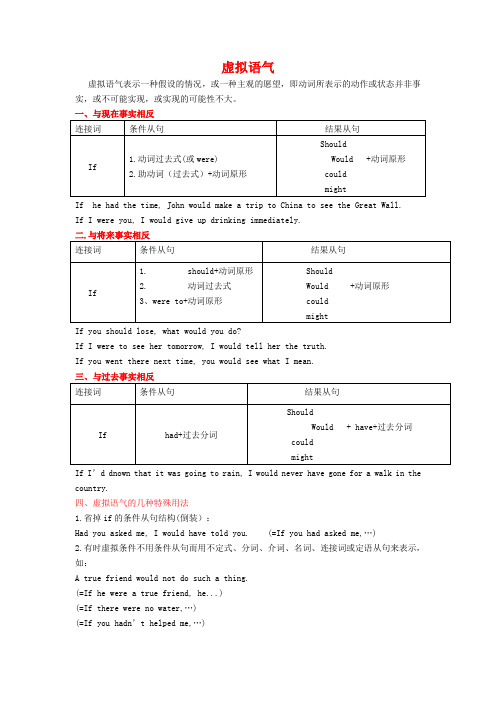
虚拟语气虚拟语气表示一种假设的情况,或一种主观的愿望,即动词所表示的动作或状态并非事实,或不可能实现,或实现的可能性不大。
If he had the time, John would make a trip to China to see the Great Wall.If I were you, I would give up drinking immediately.If you should lose, what would you do?If I were to see her tomorrow, I would tell her the truth.If you went there next time, you would see what I mean.If I’d dnown that it was going to rain, I would never have gone for a walk in the country.四、虚拟语气的几种特殊用法1.省掉if的条件从句结构(倒装):Had you asked me, I would have told you. (=If you had asked me,…)2.有时虚拟条件不用条件从句而用不定式、分词、介词、名词、连接词或定语从句来表示,如:A true friend would not do such a thing.(=If he were a true friend, he...)(=If there were no water,…)(=If you hadn’t helped me,…)3. 错综时间条件句。
当从句与主句表示的动作或状态发生的时间不一致时,根据需要选择相应时态。
,如:If he had followed the doctor’s advice, he would be quite all right now.If I were you, I would have gone home.五、虚拟语气的其他用法——此类不分析实际的可能性。
【英语】初中必备英语虚拟语气技巧全解及练习题(含答案)及解析
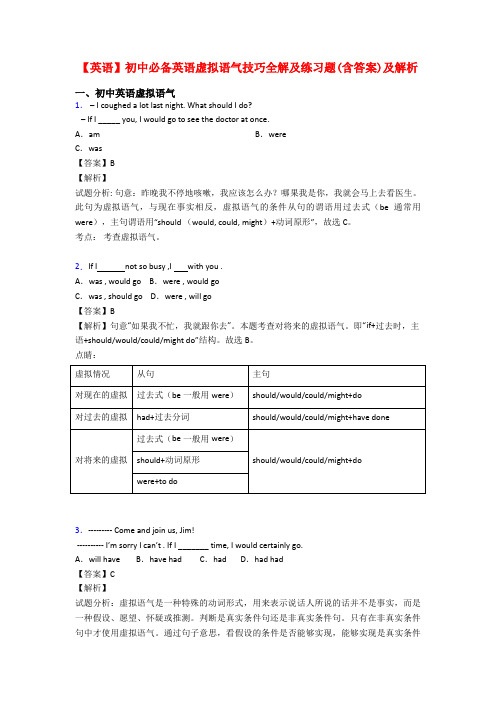
【英语】初中必备英语虚拟语气技巧全解及练习题(含答案)及解析一、初中英语虚拟语气1.– I coughed a lot last night. What should I do?– If I _____ you, I would go to see the doctor at once.A.am B.wereC.was【答案】B【解析】试题分析: 句意:昨晚我不停地咳嗽,我应该怎么办?哪果我是你,我就会马上去看医生。
此句为虚拟语气,与现在事实相反,虚拟语气的条件从句的谓语用过去式(be通常用were),主句谓语用“should (would, could, might)+动词原形”,故选C。
考点:考查虚拟语气。
2.If I not so busy ,I with you .A.was , would go B.were , would goC.was , should go D.were , will go【答案】B【解析】句意“如果我不忙,我就跟你去”。
本题考查对将来的虚拟语气。
即“if+过去时,主语+should/would/could/might do”结构。
故选B。
点睛:3.--------- Come and join us, Jim!---------- I’m sorry I can’t . If I _______ time, I would certainly go.A.will have B.have had C.had D.had had【答案】C【解析】试题分析:虚拟语气是一种特殊的动词形式,用来表示说话人所说的话并不是事实,而是一种假设、愿望、怀疑或推测。
判断是真实条件句还是非真实条件句。
只有在非真实条件句中才使用虚拟语气。
通过句子意思,看假设的条件是否能够实现,能够实现是真实条件句,不能使用虚拟语气;假设的条件不能实现则是非真实条件句,要用虚拟语气.判断这个假设是与哪个事实相反。
初中虚拟语气讲解及练习含含答案
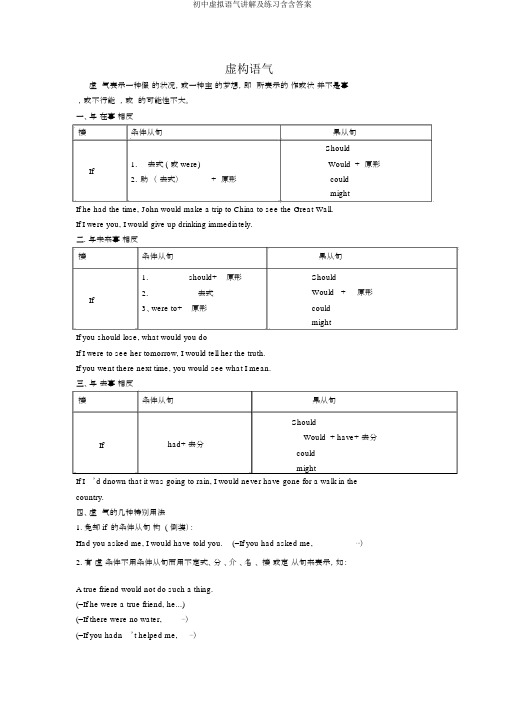
虚构语气虚气表示一种假的状况,或一种主的梦想,即所表示的作或状并不是事,或不行能,或的可能性不大。
一、与在事相反接条件从句果从句ShouldIf 1. 去式 ( 或 were) Would +原形2. 助(去式)+原形couldmightIf he had the time, John would make a trip to China to see the Great Wall. If I were you, I would give up drinking immediately.二. 与未来事相反接条件从句果从句1. should+ 原形ShouldIf 2. 去式Would + 原形3、were to+ 原形couldmightIf you should lose, what would you doIf I were to see her tomorrow, I would tell her the truth.If you went there next time, you would see what I mean.三、与去事相反接条件从句果从句ShouldIf had+去分Would + have+去分couldmightIf I’d dnown that it was going to rain, I would never have gone for a walk in the country.四、虚气的几种特别用法1.免却 if 的条件从句构 ( 倒装):Had you asked me, I would have told you. (=If you had asked me,⋯)2.有虚条件不用条件从句而用不定式、分、介、名、接或定从句来表示,如:A true friend would not do such a thing.(=If he were a true friend, he...)(=If there were no water,⋯)(=If you hadn’t helped me,⋯)3.条件句。
英语虚拟语气常见题型及答题技巧及练习题(含答案)及解析

英语虚拟语气常见题型及答题技巧及练习题(含答案)及解析一、初中英语虚拟语气1.If I _____ you ,I _____ them the story.A. was , tell B.were , will tell C.were ,wou ld tell D.am. would tell【答案】C【解析】试题分析:句意:如果我是你,我会告诉他们这个故事。
本题考查虚拟语气,if 从句中用一般过去时,主句中用would +动词原形,表示与现在的事实相反。
故选C。
考点:考查虚拟语气的用法。
2.You should_______ watched TV. There is so much work to do,A.not have B.have not C.not D.not having【答案】A【解析】句意“你本不应该看足球比赛,你有许多的工作要做”。
本题考查虚拟语气,shouldn't have done本不该做……却做了。
根据句意,故选A。
3.If I you, I the army.A.am, would join B.were, would join C.am, will join D.were, will join【答案】B【解析】试题分析:句意:如果我是你,我会参军.结合语境可知本句是对客观状况的虚拟,故用过去时态,主句用过去将来时态.选B.考点:if引导的条件状语从句点评:虚拟语气是一种特殊的动词形式,用来表示说话人所说的话并不是事实,而是一种假设、愿望、怀疑或推测。
判断是真实条件句还是非真实条件句。
只有在非真实条件句中才使用虚拟语气。
通过句子意思,看假设的条件是否能够实现,能够实现是真实条件句,不能使用虚拟语气;假设的条件不能实现则是非真实条件句,要用虚拟语气.判断这个假设是与哪个事实相反。
1、与现在事实相反若与现在事实相反,条件从句的谓语用过去式(be通常用were),主句谓语用“should (would, could, might)+动词原形”2、与过去事实相反若与过去事实相反,条件从句的谓语用过去完成时(had+过去分词),主句谓语用“should (would, could, might)+have+过去分词”3、与将来事实相反若与将来事实相反,条件从句的谓语用过去式(be通常用were),主句谓语用“should (would, could, might)+动词原形”。
(2021年整理)初中虚拟语气讲解及专项练习与答案(带解析)

(完整版)初中虚拟语气讲解及专项练习与答案(带解析)编辑整理:尊敬的读者朋友们:这里是精品文档编辑中心,本文档内容是由我和我的同事精心编辑整理后发布的,发布之前我们对文中内容进行仔细校对,但是难免会有疏漏的地方,但是任然希望((完整版)初中虚拟语气讲解及专项练习与答案(带解析))的内容能够给您的工作和学习带来便利。
同时也真诚的希望收到您的建议和反馈,这将是我们进步的源泉,前进的动力。
本文可编辑可修改,如果觉得对您有帮助请收藏以便随时查阅,最后祝您生活愉快业绩进步,以下为(完整版)初中虚拟语气讲解及专项练习与答案(带解析)的全部内容。
(完整版)初中虚拟语气讲解及专项练习与答案(带解析)编辑整理:张嬗雒老师尊敬的读者朋友们:这里是精品文档编辑中心,本文档内容是由我和我的同事精心编辑整理后发布到文库,发布之前我们对文中内容进行仔细校对,但是难免会有疏漏的地方,但是我们任然希望 (完整版)初中虚拟语气讲解及专项练习与答案(带解析) 这篇文档能够给您的工作和学习带来便利。
同时我们也真诚的希望收到您的建议和反馈到下面的留言区,这将是我们进步的源泉,前进的动力.本文可编辑可修改,如果觉得对您有帮助请下载收藏以便随时查阅,最后祝您生活愉快业绩进步,以下为 <(完整版)初中虚拟语气讲解及专项练习与答案(带解析)〉这篇文档的全部内容。
虚拟语气讲解语气 (mood)是一种动词形式,用以表示说话者的意图或态度。
英语中的语气有三种:陈述语气、祈使语气和虚拟语气。
直陈语气(indicative mood),表示所说的话是事实.祈使语气 (imperative mood),表示所说的话是请求或命令。
虚拟语气(subjunctive mood),表示说的话不是事实,或者是不可能发生的情况,而是一种愿望、建议或与事实相反的假设等。
一. 虚拟语气在条件句中的应用学习虚拟语气在条件句中的用法之前我们必须清楚条件句的种类:条件句有真实条件句与非真实条件句(或称虚拟条件句)两种。
初中虚拟语气讲解及专项练习与答案(带解析)
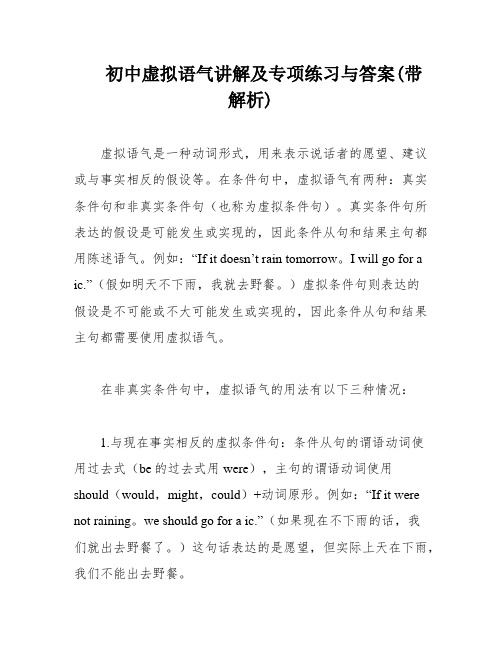
初中虚拟语气讲解及专项练习与答案(带解析)虚拟语气是一种动词形式,用来表示说话者的愿望、建议或与事实相反的假设等。
在条件句中,虚拟语气有两种:真实条件句和非真实条件句(也称为虚拟条件句)。
真实条件句所表达的假设是可能发生或实现的,因此条件从句和结果主句都用陈述语气。
例如:“If it doesn’t rain tomorrow。
I will go for a ic.”(假如明天不下雨,我就去野餐。
)虚拟条件句则表达的假设是不可能或不大可能发生或实现的,因此条件从句和结果主句都需要使用虚拟语气。
在非真实条件句中,虚拟语气的用法有以下三种情况:1.与现在事实相反的虚拟条件句:条件从句的谓语动词使用过去式(be的过去式用were),主句的谓语动词使用should(would,might,could)+动词原形。
例如:“If it were not raining。
we should go for a ic.”(如果现在不下雨的话,我们就出去野餐了。
)这句话表达的是愿望,但实际上天在下雨,我们不能出去野餐。
2.与过去事实相反的虚拟条件句:条件从句的谓语动词使用had+过去分词,主句的谓语动词使用should(would,might,could)+have+过去分词。
例如:“If he had come here。
he might have been able to help you.”(如果他来过这里,他或许能够帮助你。
)这句话表达的是对过去事实的假设,但实际上他没有来这里,他也没有帮助你。
3.与将来事实可能相反的虚拟条件句:条件从句的谓语动词可以使用动词过去式(be的过去式用were)、should+动词原形或were to+动词原形,主句的谓语动词使用should (would,might,could)+动词原形。
例如:“If it should rain tomorrow。
XXX.”(如果明天下雨的话,我们就取消野餐计划。
初中英语虚拟语气专项训练及答案及解析

一、初中英语虚拟语气
1.If I _____ one million dollars, I________ travel around the world with my parents.
A.have; will
B.had; will
C.had; will
D.had; would
一般用 were);主句(结果句) should /would/ could/ might +动词原形。故答案为 C。 考点:考查虚拟语气。
11.Yesterday, the storm delayed us. _______ the storm, we would have been here in time.
A.win
B.won
C.will win
D.is to win
【答案】B
【解析】
试题分析:句意:如果你赢了一百万美元,你要做什么?——我会把它捐给慈善机构。结
合语境可知条件从句中描述的是与将来相反的事实,故用一般过去时态,选 B。
考点:if 引导的条件状语从句
点评:虚拟语气是一种特殊的动词形式,用来表示说话人所说的话并不是事实,而是一种
事实,或与事实相反。在虚拟条件语气句中,表示与现在事实相反的事实,条件从句中的 谓语动词用过去式(be 用 were 不用 was),主句谓语动词为“would+原形动词”,所以选 D。 考点:考查虚拟语气。
8.—A student in my class said to me, “if I ______our math teacher, I_____ make math learning easier and more interesting instead of giving the kids much homework to do every day.” A.were, would B.am, will C.was, would D.were, will 【答案】A 【解析】 试题分析:句意:我班里的一个学生对我说:如果我是数学老师,我会使数学学习更简单 有趣,而不是每天给学生许多作业去做。虚拟语气是一种特殊的动词形式,用来表示说话 人所说的话并不是事实,而是一种假设、愿望、怀疑或推测。其主要有三种结构: 1、与现在事实相反 若与现在事实相反,条件从句的谓语用过去式(be 通常用 were),主句谓语用“should (would, could, might)+动词原形” 2、与过去事实相反 若与过去事实相反,条件从句的谓语用过去完成时(had+过去分词),主句谓语用“should (would, could, might)+have+过去分词” 3、与将来事实相反 若与将来事实相反,条件从句的谓语用过去式(be 通常用 were),主句谓语用“should (would, could, might)+动词原形”。 该句描述的是与现状相反的事实故选 A。 考点:考查虚拟语气。
初中英语虚拟语气专项训练100(附答案)及解析
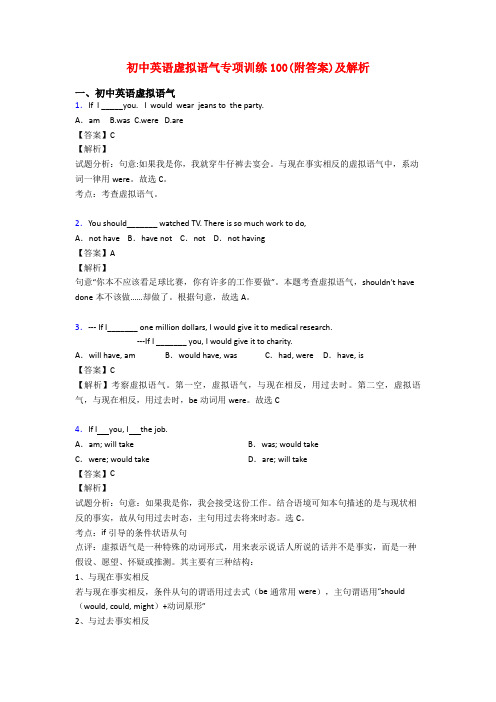
初中英语虚拟语气专项训练100(附答案)及解析一、初中英语虚拟语气1.If I _____you. I would wear jeans to the party.A.am B.was C.were D.are【答案】C【解析】试题分析:句意:如果我是你,我就穿牛仔裤去宴会。
与现在事实相反的虚拟语气中,系动词一律用were。
故选C。
考点:考查虚拟语气。
2.You should_______ watched TV. There is so much work to do,A.not have B.have not C.not D.not having【答案】A【解析】句意“你本不应该看足球比赛,你有许多的工作要做”。
本题考查虚拟语气,shouldn't have done本不该做……却做了。
根据句意,故选A。
3.--- If I_______ one million dollars, I would give it to medical research.---If I _______ you, I would give it to charity.A.will have, am B.would have, was C.had, were D.have, is【答案】C【解析】考察虚拟语气。
第一空,虚拟语气,与现在相反,用过去时。
第二空,虚拟语气,与现在相反,用过去时,be动词用were。
故选C4.If I you, I the job.A.am; will take B.was; would takeC.were; would take D.are; will take【答案】C【解析】试题分析:句意:如果我是你,我会接受这份工作。
结合语境可知本句描述的是与现状相反的事实,故从句用过去时态,主句用过去将来时态。
选C。
考点:if引导的条件状语从句点评:虚拟语气是一种特殊的动词形式,用来表示说话人所说的话并不是事实,而是一种假设、愿望、怀疑或推测。
初中必备英语虚拟语气技巧全解及练习题(含答案)含解析
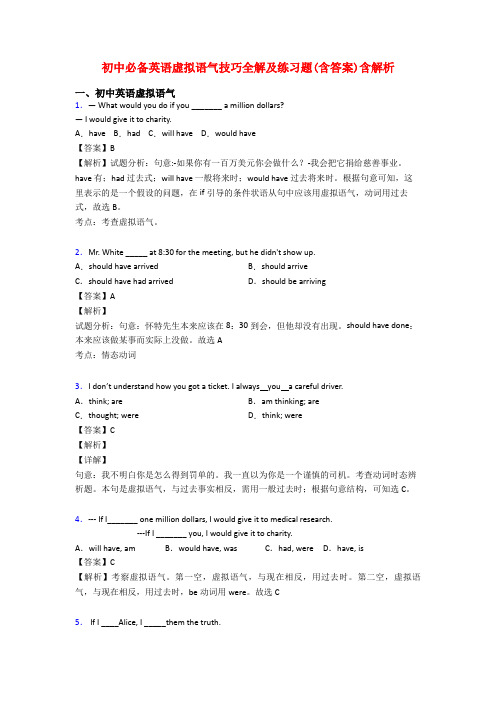
初中必备英语虚拟语气技巧全解及练习题(含答案)含解析一、初中英语虚拟语气1.— What would you do if you _______ a million dollars?— I would give it to charity.A.have B.had C.will have D.would have【答案】B【解析】试题分析:句意:-如果你有一百万美元你会做什么?-我会把它捐给慈善事业。
have 有;had 过去式;will have 一般将来时;would have 过去将来时。
根据句意可知,这里表示的是一个假设的问题,在if引导的条件状语从句中应该用虚拟语气,动词用过去式,故选B。
考点:考查虚拟语气。
2.Mr. White _____ at 8:30 for the meeting, but he didn't show up.A.should have arrived B.should arriveC.should have had arrived D.should be arriving【答案】A【解析】试题分析:句意:怀特先生本来应该在8:30到会,但他却没有出现。
should have done:本来应该做某事而实际上没做。
故选A考点:情态动词3.I don’t understand how you got a ticket. I always you a careful driver.A.think; are B.am thinking; areC.thought; were D.think; were【答案】C【解析】【详解】句意:我不明白你是怎么得到罚单的。
我一直以为你是一个谨慎的司机。
考查动词时态辨析题。
本句是虚拟语气,与过去事实相反,需用一般过去时;根据句意结构,可知选C。
4.--- If I_______ one million dollars, I would give it to medical research.---If I _______ you, I would give it to charity.A.will have, am B.would have, was C.had, were D.have, is【答案】C【解析】考察虚拟语气。
初中必备英语虚拟语气技巧全解及练习题(含答案)含解析

初中必备英语虚拟语气技巧全解及练习题(含答案)含解析一、初中英语虚拟语气1. If I ______ you, I _____the job.A.was; will take B.was; would take C.were; would take D.were; will take 【答案】 C【解析】试题分析:句意:如果我是你,我就要这份工作。
If引导的句子是愿望时,用过去式表示,而且系动词用were,主句用would加原形。
故选C。
考点: 考查虚拟语气的用法。
2.You should_______ watched TV. There is so much work to do,A.not have B.have not C.not D.not having【答案】A【解析】句意“你本不应该看足球比赛,你有许多的工作要做”。
本题考查虚拟语气,shouldn't have done本不该做……却做了。
根据句意,故选A。
3.--- If I_______ one million dollars, I would give it to medical research.---If I _______ you, I would give it to charity.A.will have, am B.would have, was C.had, were D.have, is【答案】C【解析】考察虚拟语气。
第一空,虚拟语气,与现在相反,用过去时。
第二空,虚拟语气,与现在相反,用过去时,be动词用were。
故选C4. If I went to the moon, I ______ bring something unusual back to the earth.A.couldB.willC.wouldD.shall【答案】C【解析】试题分析:此题考查if引导的条件状语从句的相关知识。
根据语境可知此句的含义是如果我去月球,我会带回一些不同寻常的东西。
【英语】初中必备英语虚拟语气技巧全解及练习题(含答案)及解析

【英语】初中必备英语虚拟语气技巧全解及练习题(含答案)及解析一、初中英语虚拟语气1.If I______ you, I would take a small present..A.am B.was C.were D.are【答案】C【解析】试题分析:句意:如果我我你,我会那个小的礼物。
句中用虚拟语气,系动词用were,故选C。
考点:考查虚拟语气。
2.--------- Come and join us, Jim!---------- I’m sorry I can’t . If I _______ time, I would certainly go.A.will have B.have had C.had D.had had【答案】C【解析】试题分析:虚拟语气是一种特殊的动词形式,用来表示说话人所说的话并不是事实,而是一种假设、愿望、怀疑或推测。
判断是真实条件句还是非真实条件句。
只有在非真实条件句中才使用虚拟语气。
通过句子意思,看假设的条件是否能够实现,能够实现是真实条件句,不能使用虚拟语气;假设的条件不能实现则是非真实条件句,要用虚拟语气.判断这个假设是与哪个事实相反。
(1)、与现在事实相反若与现在事实相反,条件从句的谓语用过去式(be通常用were),主句谓语用“should (would, could, might)+动词原形”(2)、与过去事实相反若与过去事实相反,条件从句的谓语用过去完成时(had+过去分词),主句谓语用“should (would, could, might)+have+过去分词”(3)、与将来事实相反若与将来事实相反,条件从句的谓语用过去式(be通常用were),主句谓语用“should (would, could, might)+动词原形”:句意:吉姆,来加入我们吧!抱歉,我不能。
如果我有时间,我肯定会去的。
结合语境可知下文中表示与现在相反的事实,故条件状语从句中用一般故去时态,选C。
初中必备英语虚拟语气技巧全解及练习题(含答案)含解析
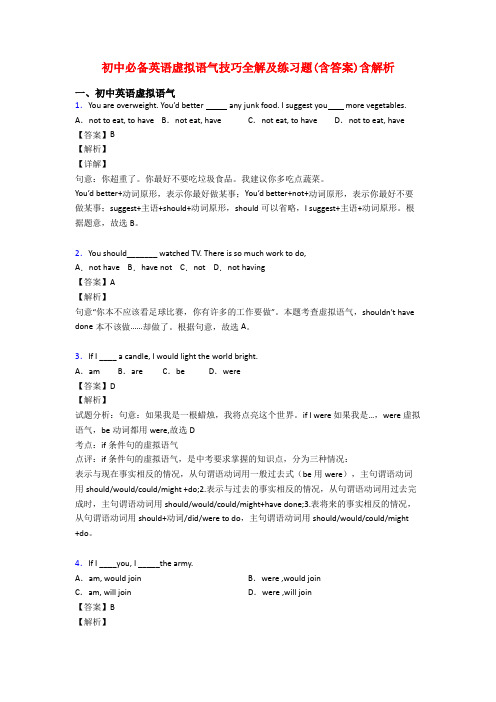
初中必备英语虚拟语气技巧全解及练习题(含答案)含解析一、初中英语虚拟语气1.You are overweight. You’d better any junk food. I suggest you more vegetables. A.not to eat, to have B.not eat, have C.not eat, to have D.not to eat, have 【答案】B【解析】【详解】句意:你超重了。
你最好不要吃垃圾食品。
我建议你多吃点蔬菜。
You’d better+动词原形,表示你最好做某事;You’d better+not+动词原形,表示你最好不要做某事;suggest+主语+should+动词原形,should可以省略,I suggest+主语+动词原形。
根据题意,故选B。
2.You should_______ watched TV. There is so much work to do,A.not have B.have not C.not D.not having【答案】A【解析】句意“你本不应该看足球比赛,你有许多的工作要做”。
本题考查虚拟语气,shouldn't have done本不该做……却做了。
根据句意,故选A。
3.If I ____ a candle, I would light the world bright.A.am B.are C.be D.were【答案】D【解析】试题分析:句意:如果我是一根蜡烛,我将点亮这个世界。
if I were 如果我是…,were虚拟语气,be动词都用were,故选D考点:if条件句的虚拟语气点评:if条件句的虚拟语气,是中考要求掌握的知识点,分为三种情况:表示与现在事实相反的情况,从句谓语动词用一般过去式(be用were),主句谓语动词用should/would/could/might +do;2.表示与过去的事实相反的情况,从句谓语动词用过去完成时,主句谓语动词用should/would/could/might+have done;3.表将来的事实相反的情况,从句谓语动词用should+动词/did/were to do,主句谓语动词用should/would/could/might +do。
中考必备英语虚拟语气技巧全解及练习题(含答案)

中考必备英语虚拟语气技巧全解及练习题(含答案)一、初中英语虚拟语气1. If I you,I buy a bike for him.A.was,would B.was,could C.were,would D.were,could【答案】C【解析】试题分析:句意:如果我是你,我会给他买一辆自行车。
buy sth for sb给某人买某物;本句用的是虚拟语气,表示与现在的事实相反,在虚拟语气中不能用was,而用were,因此选C。
考点:考查虚拟语气的用法。
2.You should_______ watched TV. There is so much work to do,A.not have B.have not C.not D.not having【答案】A【解析】句意“你本不应该看足球比赛,你有许多的工作要做”。
本题考查虚拟语气,shouldn't have done本不该做……却做了。
根据句意,故选A。
3.If I you, I the job.A.am; will take B.was; would takeC.were; would take D.are; will take【答案】C【解析】试题分析:句意:如果我是你,我会接受这份工作。
结合语境可知本句描述的是与现状相反的事实,故从句用过去时态,主句用过去将来时态。
选C。
考点:if引导的条件状语从句点评:虚拟语气是一种特殊的动词形式,用来表示说话人所说的话并不是事实,而是一种假设、愿望、怀疑或推测。
其主要有三种结构:1、与现在事实相反若与现在事实相反,条件从句的谓语用过去式(be通常用were),主句谓语用“should (would, could, might)+动词原形”2、与过去事实相反若与过去事实相反,条件从句的谓语用过去完成时(had+过去分词),主句谓语用“should (would, could, might)+have+过去分词”3、与将来事实相反若与将来事实相反,条件从句的谓语用过去式(be通常用were),主句谓语用“should (would, could, might)+动词原形”:4. If I went to the moon, I ______ bring something unusual back to the earth.A.couldB.willC.wouldD.shall【答案】C【解析】试题分析:此题考查if引导的条件状语从句的相关知识。
初中必备英语虚拟语气技巧全解及练习题(含答案)及解析

初中必备英语虚拟语气技巧全解及练习题(含答案)及解析一、初中英语虚拟语气1.If I______ you, I would take a small present..A.am B.was C.were D.are【答案】C【解析】试题分析:句意:如果我我你,我会那个小的礼物。
句中用虚拟语气,系动词用were,故选C。
考点:考查虚拟语气。
2.--What would you do if you ____ a million dollars?--I’d give it to the charityA.win B.won C.will win D.is to win【答案】B【解析】试题分析:句意:如果你赢了一百万美元,你要做什么?——我会把它捐给慈善机构。
结合语境可知条件从句中描述的是与将来相反的事实,故用一般过去时态,选B。
考点:if引导的条件状语从句点评:虚拟语气是一种特殊的动词形式,用来表示说话人所说的话并不是事实,而是一种假设、愿望、怀疑或推测。
判断是真实条件句还是非真实条件句。
只有在非真实条件句中才使用虚拟语气。
通过句子意思,看假设的条件是否能够实现,能够实现是真实条件句,不能使用虚拟语气;假设的条件不能实现则是非真实条件句,要用虚拟语气.判断这个假设是与哪个事实相反。
1、与现在事实相反若与现在事实相反,条件从句的谓语用过去式(be通常用were),主句谓语用“should (would, could, might)+动词原形”2、与过去事实相反若与过去事实相反,条件从句的谓语用过去完成时(had+过去分词),主句谓语用“should (would, could, might)+have+过去分词”3、与将来事实相反若与将来事实相反,条件从句的谓语用过去式(be通常用were),主句谓语用“should (would, could, might)+动词原形”:3.If I you, I the army.A.am, would join B.were, would join C.am, will join D.were, will join【答案】B【解析】试题分析:句意:如果我是你,我会参军.结合语境可知本句是对客观状况的虚拟,故用过去时态,主句用过去将来时态.选B.考点:if引导的条件状语从句点评:虚拟语气是一种特殊的动词形式,用来表示说话人所说的话并不是事实,而是一种假设、愿望、怀疑或推测。
[参考实用]初中虚拟语气讲解及专项练习与答案(带解析)
![[参考实用]初中虚拟语气讲解及专项练习与答案(带解析)](https://img.taocdn.com/s3/m/2d378f2459eef8c75fbfb388.png)
虚拟语气专练1.Ienjoyedthemovieverymuch.IwishI_____thebookfromwhichitwasmade.A.havereadB.hadreadC.shouldhavereadD.arereading2.Youarelate.Ifyou_____afewminutesearlieryou_____him.ewouldmeetB.hadcomewouldhavemetewillmeetD.hadcomewouldmeet3.Thetwostudentstalkedasifthey_____friendsforyears.A.shouldbeB.wouldbeC.havebeenD.hadbeen4.ItisimportantthatI_____withMr.Williamsimmediately.A.speakB.spokeC.willspeakD.tospeak5.Helookedasifhe_____illforalongtime.A.wasB.wereC.hasbeenD.hadbeen6.Ifthedoctorhadcomeearlierthepoorchildwouldnot_____.A.havelaidtherefortwohoursB.havebeenliedtherefortwohoursC.haveliedtherefortwohoursD.havelaintherefortwohours7.IwishthatI_____withyoulastnight.A.wentB.couldgoC.havegoneD.couldhavegone8.Let’s sayyoucouldgothereagainhow_____feelA.willyouB.shouldyouC.wouldyouD.doyou9.I can’t standhim.Healwaystalksasthoughhe_____everything.A.knewB.knowsC.hasknownD.hadknown10._____thefogweshouldhavereachedourschool.A.BecauseofB.InspiteofC.IncaseofD.Butfor11.IfyouhadtoldmeinadvanceI_____himattheairport.A.wouldmeetB.wouldhadmetC.wouldhavemetD.wouldhavemeet12.Mikecantakehiscarapartandputitbacktogetheragain.Icertainlywishhe_____mehow.A.teachesB.willteachC.hastaughtD.wouldteach13.IwouldhavetoldhimtheanswerhaditbeenpossiblebutI_____sobusythen.A.hadbeenB.wereC.wasD.wouldbe14.He’s workinghardforfearthathe_____.A.shouldfallbehindB.fellbehindC.mayfallbehindD.wouldfallenbehind15.Ifit_____anothertenminutesthegamewouldhavebeencalledoff.A.hadrainedB.wouldhaverainedC.haveseenD.rained16.Hesuggestedthatthey_____useatrickinsteadoffighting.A.ShouldB.wouldC.doD.had17.MyfatherdidnotgotoNewYorkthedoctorsuggestedthathe_____there.A.notwentB.won’t goC.notgoD.nottogo18.IwouldhavegonetothemeetingifI_____time.A.hadhadB.havehadC.hadD.wouldhavehad19.WouldyouratherI_____buyinganewbikeA.decidedagainstB.willdecideagainstC.havedecidedD.shalldecideagainst20.Youlooksotiredtonight.Itistimeyou_____.A.gotosleepB.wenttosleepC.gotobedD.wenttobed21.—Why didn’t youbuyanewcar—IwouldhaveboughtoneifI_____enoughmoney.A.hadB.havehadC.wouldhaveD.hadhad22.Ifshecouldsew_____.A.shemakeadressB.shewouldhavemadeashirtC.shewillmakeashirtD.shewouldhadmadeacoat23._____todayhewouldgettherebyFriday.A.WouldheleaveB.WasheleavingC.WerehetoleaveD.Ifheleaves24.Hisdoctorsuggestedthathe_____ashorttripabroad.A.willtakeB.wouldtakeC.takeD.took25.TheBakersarrivedlastnight.If they’d onlyletusknowearlier_____atthestation.A.we’d meetthemB.we’ll meetthemC.we’d havemetthemD.we’ve metthem26.IfI_____youI_____moreattentiontoEnglishidiomsandphrases.A.wasshallpayB.amwillpayC.wouldbewouldpayD.werewouldpay27.Wemighthavefailedifyou_____usahelpinghand.A.havenotgivenB.wouldnotgiveC.hadnotgivenD.didnotgive28.Thelawrequiresthateveryone_____hiscarcheckedatleastonceayear.A.hasB.hadC.haveD.willhave29.Itisstrangethathe_____so.A.wouldsayB.wouldspeakC.shouldsayD.willspeak30.HadIknownhername_____A.ordoessheknowmineB.andwheredoessheliveC.shewouldbebeautiful.D.Iwouldhaveinvitedhertolunch.31.Hehasjustarrivedbuthetalksasifhe_____allaboutthat.A.knowB.knowsC.knownD.knew32.IfI_____themoneyIwouldhaveboughtamuchbiggercar.A.possessedB.ownedC.hadD.hadhad33.Hewasverybusyyesterdayotherwisehe_____tothemeeting.A.wouldcomeB.cameC.wouldhavecomeD.willcome34.ThelibrarianinsiststhatJohn_____nomorebooksfromthelibrarybeforehereturnsallthebook shehasborrowed.A.willtakeB.tookC.takeD.takes35.IleftveryearlylastnightbutIwishI_____soearly.A.didn’t leaveB.hadn’t leftC.haven’t leftD.couldn’t leave36.Idonothaveajob.IwouldfindonebutI_____notime.A.hadB.didn’t haveC.hadhadD.have37.Iwishthatyou_____suchabadheadachebecause I’m surethatyouwouldhaveenjoyedtheco ncert.A.hadn’tB.didn’t havehadC.hadn’t hadD.hadn’t have38.Heinsistedthatweall_____inhisofficeatone o’clock.A.beB.tobeC.wouldbeD.shallbe39.Helen couldn’t gotoFranceafterall.That’s toobad.I’m sureshewouldhaveenjoyeditif___ __.A.she’s goneB.she’ll goC.she’d goneD.she’d go40.Imustgothereearlier.JohnhassuggestedthatI_____anhourbeforethediscussionbegins.A.goB.shallgoC.willgoD.wouldgo英语虚拟语气讲解语气(mood)是一种动词形式,用以表示说话者的意图或态度。
- 1、下载文档前请自行甄别文档内容的完整性,平台不提供额外的编辑、内容补充、找答案等附加服务。
- 2、"仅部分预览"的文档,不可在线预览部分如存在完整性等问题,可反馈申请退款(可完整预览的文档不适用该条件!)。
- 3、如文档侵犯您的权益,请联系客服反馈,我们会尽快为您处理(人工客服工作时间:9:00-18:30)。
虚拟语气讲解语气(mood) 是一种动词形式,用以表示说话者的意图或态度。
英语中的语气有三种:陈述语气、祈使语气和虚拟语气。
直陈语气(indicative mood),表示所说的话是事实。
祈使语气(imperative mood),表示所说的话是请求或命令。
虚拟语气(subjunctive mood),表示说的话不是事实,或者是不可能发生的情况,而是一种愿望、建议或与事实相反的假设等。
一. 虚拟语气在条件句中的应用学习虚拟语气在条件句中的用法之前我们必须清楚条件句的种类:条件句有真实条件句与非真实条件句(或称虚拟条件句)两种。
真实条件句所表的假设是可能发生或实现的,句中的条件从句与结果主句都用陈述语气。
如:If it doesn’t rain tomorrow, I will go for a picnic. 假若明天不下雨,我就去野餐。
Oil floats if you pour it on water. 你如把油倒在水里,油就浮起来。
虚拟条件句所表的假设则是不可能或不大可能发生或实现的,句中的条件从句与结果主句皆须用虚拟语气。
条件从句主句与现在事实相反If 主语+动词过去式(be的过去式用were)should (would, might,could)+动词原形与过去事实相反If 主语+had+过去分词should (would, might,could)+ have +过去分词与将来事实可能相反If 主语+动词过去式(be的过去式用were);should+动词原形;were to+动词原形should (would, might,could)+动词原形1. 与现在事实相反的虚拟条件句,条件从句的谓语用动词的过去式(be的过去式用were), 主句的谓语用should (would, might,could)+动词原形。
如:If it were not raining, we should go for a picnic.如果现在不下雨的话,我们就出去野餐了。
(事实是:天在下雨,我们不能出去野餐。
表示愿望。
)If he came here, he might be able to help you. 如果他来这,他就能够帮助你了。
(事实是:他没来这,他不可能帮助你。
表示对他的良好印象。
)2. 与过去事实相反的虚拟条件句,条件从句的谓语用had+过去分词,主句的谓语用should (would, might,could)+ have +过去分词。
如:She would have gone to the party if she had been invited.要是当初她被邀请的话,她就会去参加这次聚会了。
(事实是:当时没有人邀请她,因此,她没有来参加聚会。
表示后悔。
)If she hadn't called me, I would have overslept this morning.今天早上,她要是不叫我的话,我就会睡过头了。
(事实是:她今天早上叫我了,我没有睡过头。
表示感激。
)3. 与将来事实可能相反的虚拟条件句,条件从句的谓语用动词的过去式(be的过去式用were);should+动词原形;were to+动词原形,主句用should (would, might,could)+动词原形。
如:If I were to be twenty years old next year, I would take the course of French.明年我要是二十岁,我就会学法语。
(事实是:我现在已经老了,明年我学不了法语了。
)If it should fail, I would try again.要是失败了,我会再试一次。
(事实是:有可能失败,可我会再试。
表示未知。
)虚拟语气专练1.I enjoyed the movie very much. I wish I _____ the book from which it was made.A. have readB. had readC. should have readD. are reading2.You are late. If you _____ a few minutes earlier you _____ him.A. come ,would meetB. had come, would have metC. come, will meetD. had come, would meet3.The two students talked as if they _____ friends for years.A. should beB. would beC. have beenD. had been4.It is important that I _____ with Mr. Williams immediately.A. speakB. spokeC. will speakD. to speak5.He looked as if he _____ ill for a long time.A. wasB. wereC. has beenD. had been6.If the doctor had come earlier the poor child would not _____.A. have laid there for two hoursB. have been lied there for two hoursC. have lied there for two hoursD. have lain there for two hours7.I wish that I _____ with you last night.A. wentB. could goC. have goneD. could have gone8.Let’s say you could go there again how _____ feelA. will youB. should youC. would youD. do you9.I can’t stand him. He always talks as though he _____ everythin g.A. knewB. knowsC. has knownD. had known10._____ the fog we should have reached our school.A. Because ofB. In spite ofC. In case ofD. But for11.If you had told me in advance I _____ him at the airport.A. would meetB. would had metC. would have metD. would have meet12.Mike can take his car apart and put it back together again. I certainly wish he_____ me how.A. teachesB. will teachC. has taughtD. would teach13.I would have told him the answer had it been possible but I _____ so busy then.A. had beenB. wereC. wasD. would be14.He’s working hard for fear that he _____.A. should fall behindB. fell behindC. may fall behindD. would fallen behind15.If it _____ another ten minutes the game would have been called off.A. had rainedB. would have rainedC. have seenD. rained16.He suggested that they _____ use a trick instead of fighting.A. ShouldB. wouldC. doD. had17.My father did not go to New York the doctor suggested that he _____ there.A. not wentB. won’t goC. not goD. not to go18.I would have gone to the meeting if I _____ time.A. had hadB. have hadC. hadD. would have had19.Would you rather I _____ buying a new bikeA. decided againstB. will decide againstC. have decidedD. shall decide against20.You look so tired tonight. It is time you _____.A. go to sleepB. went to sleepC. go to bedD. went to bed21.—Why didn’t you buy a new car —I would have bought one if I _____ enough money.A. hadB. have hadC. would haveD. had had22.If she could sew _____.A. she make a dressB. she would have made a shirtC. she will make a shirtD. she would had made a coat23._____ today he would get there by Friday.A. Would he leaveB. Was he leavingC. Were he to leaveD. If he leaves24.His doctor suggested that he _____ a short trip abroad.A. will takeB. would takeC. takeD. took25.The Bakers arrived last night. If they’d only let us know earlier_____ at the station.A. we’d meet themB. we’ll meet themC. we’d have met themD. we’ve met them26.If I _____ you I _____ more attention to English idioms and phrases.A. was, shall payB. am, will payC. would be, would payD. were, would pay27.We might have failed if you _____ us a helping hand.A. have not givenB. would not giveC. had not givenD. did not give28.The law requires that everyone _____ his car checked at least once a year.A. hasB. hadC. haveD. will have29.It is strange that he _____ so.A. would sayB. would speakC. should sayD. will speak30.Had I known her name _____A. or does she know mineB. and where does she liveC. she would be beautiful.D. I would have invited her to lunch.31.He has just arrived but he talks as if he _____ all about that.A. knowB. knowsC. knownD. knew32.If I _____ the money I would have bought a much bigger car.A. possessedB. ownedC. hadD. had had33.He was very busy yesterday otherwise he _____ to the meeting.A. would comeB. cameC. would have comeD. will come34.The librarian insists that John _____ no more books from the library before he returns all the books he has borrowed.A. will takeB. tookC. takeD. takes35.I left very early last night but I wish I _____ so early.A. didn’t leaveB. hadn’t leftC. haven’t leftD. couldn’t leave36.I do not have a job. I would find one but I _____ no time.A. hadB. didn’t haveC. had hadD. have37.I wish that you _____ such a bad headache because I’m sure that you would have enjoyed the concert.A. hadn’tB. didn’t have hadC. hadn’t hadD. hadn’t have38.He insisted that we all _____ in his office at one o’clock.A. beB. to beC. would beD. shall be39. -- Helen couldn’t go to France after all.--That’s too bad. I’m sure she would have enjoyed it if _____.A. she’s goneB. she’ll goC. she’d goneD. she’d go40.I must go there earlier. John has suggested that I _____ an hour before the discussion begins.A. goB. shall goC. will goD. would go1—5 BBDAD 6—10 DDCAD11—15 CDCAA16—20 ACAAD 21—25 DBCCC 26—30 DCCCD31—35 DDCCB 36—39 DCAC 解析:1.wish后面用虚拟语气,表示与过去事实相反用过去完成时。
